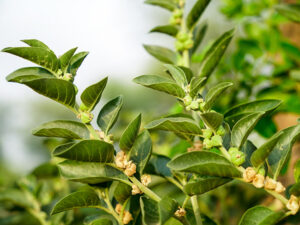If you are the parent of a child who has been diagnosed with ADHD, you may be looking for ways to help your child cope. One option that you may have heard about is ashwagandha for ADHD. Ashwagandha is an herb that has been used in traditional Indian medicine for centuries. It has a variety of health benefits, and some people believe that it can help improve symptoms of ADHD. In this blog post, we will discuss the evidence behind the use of ashwagandha for ADHD and whether or not it is a viable treatment option.
Contents
What Is Ashwagandha?

Ashwagandha is an Ayurvedic herb that has been used for centuries in India for its wide range of health benefits. Ashwagandha is also known as Withania somnifera, Indian ginseng, or winter cherry. The herb grows in India, the Middle East, and Africa.
The roots and leaves of the ashwagandha plant are used to make medicine. Ashwagandha is most commonly used for stress and anxiety. Other uses include improving thinking ability, lowering blood sugar and cholesterol levels, and reducing inflammation. This natural supplement is sometimes referred to as “Indian ginseng” because of its rejuvenating properties, even though it’s not related to true ginseng.
Ashwagandha has been used in Ayurvedic medicine for centuries. The term “Ayurveda” comes from the Sanskrit words “us” and “Veda,” which mean “life” and “knowledge,” respectively. Ayurvedic medicine is a holistic system of medicine that is native to the Indian subcontinent. It’s based on the belief that health and wellness depend on a delicate balance between the mind, body, and spirit.
According to Ayurvedic principles, ashwagandha can restore this balance. The herb is thought to promote peace and happiness while also providing energy and stamina. In addition to its use in traditional medicine, ashwagandha is gaining popularity as a natural treatment for various health conditions.
Do People Use Ashwagandha For ADHD?
Many people use ashwagandha for ADHD, but there is no scientific evidence to support these claims. Ashwagandha is an herbal remedy that has been used in traditional Indian medicine for centuries. Its purported benefits include reducing stress, improving sleep, and boosting energy levels.
People also prefer to use natural remedies like ashwagandha for ADHD because they are generally safe and have few side effects. However, it is important to talk to a doctor before taking any supplements, as they can interact with medications and may not be suitable for everyone.
There may be many reasons why people would choose ashwagandha for ADHD over conventional treatments like medication. Some may believe that it is a safer option with fewer side effects, while others may find that it is more effective for them personally. Ultimately, there is no right or wrong answer, and it is important to speak to a doctor before trying any new treatment, especially if you have a medical condition like ADHD.
What Does the Research Say?

Currently, there is no scientific evidence to support the use of ashwagandha for ADHD. However, some small studies have found that this herbal remedy may help reduce symptoms of anxiety and improve cognitive function.
A study published in the Journal of Alternative and Complementary Medicine in 2016 investigated the effects of ashwagandha on stress and anxiety levels in healthy adults. The study found that people who took ashwagandha had significantly lower levels of cortisol, a hormone produced in response to stress. Additionally, they reported feeling less anxious and more capable of coping with stressful situations.
Another study published in the same journal in 2012 looked at the effects of ashwagandha on cognitive function in adults with mild cognitive impairment. The study found that those who took ashwagandha had significantly improved scores on tests measuring memory and attention span.
These studies suggest that ashwagandha may help reduce symptoms of anxiety and improve cognitive function, but more research is needed to confirm these benefits.
How Does Ashwagandha Work?
Ashwagandha contains a chemical called withanolides, which is thought to be responsible for its medicinal properties. This chemical is similar to the active ingredient in some medications used to treat anxiety and depression.
The working of ashwagandha for ADHD is not fully understood but it is thought to work similarly to these medications. Furthermore, It is thought to work by reducing the levels of certain chemicals in the brain that are linked to stress and anxiety. This may help to improve symptoms of ADHD.
Also, this chemical is thought to have antioxidant and anti-inflammatory effects. These effects may help to protect the brain from damage and improve cognitive function.
Ashwagandha is available in supplements, which can be taken orally. However, It is also sometimes applied to the skin in a cream or ointment form. The working also makes it a popular choice for use in aromatherapy.
Health Benefits of Ashwagandha For ADHD

There are many health benefits of Ashwagandha for ADHD. This herb has been used in ayurvedic medicine for centuries and is only now being discovered by the western world. Here are some of the top reasons why you should consider using this natural remedy for your child’s ADHD.
1. It’s a Natural Treatment
Many parents are looking for natural treatments for their children’s ADHD. Ashwagandha is a great option because it’s an all-natural herb that has been used in ayurvedic medicine for centuries.
2. It Helps to Reduce Stress and Anxiety
One of the main symptoms of ADHD is stress and anxiety. Ashwagandha has been shown to help reduce both of these symptoms. This is a great benefit for children who are dealing with ADHD.
3. It Improves Focus and Concentration
Another common symptom of ADHD is difficulty concentrating and focusing. Ashwagandha has been shown to improve both of these symptoms. This is a great benefit for children who are struggling in school or with other activities that require focus and concentration.
4. It Helps to Improve Sleep
Many children with ADHD have difficulty sleeping. Ashwagandha can help improve sleep quality and quantity. This is a great benefit for children who are struggling to get a good night’s sleep.
5. It’s Safe and Effective
Ashwagandha is considered to be safe and effective for children with ADHD. However, This herb has been used in ayurvedic medicine for centuries and is only now being discovered by the western world. Furthermore, Ashwagandha is a great option for parents who are looking for a safe and effective treatment for their child’s ADHD.
If you’re looking for a natural treatment for your child’s ADHD, consider Ashwagandha. This herb has many health benefits and can help improve your child’s symptoms. Talk to your doctor about whether Ashwagandha is right for your child.
Side-Effects of Ashwagandha For ADHD
Other than the benefits, there are a few side-effects of Ashwagandha that one must be aware of before using it. These include:
1. Diarrhea: Diarrhea is the most commonly reported side-effect of Ashwagandha. Furthermore, It is believed to be caused by the plant’s saponin content. Saponins are a type of organic compound that can have a laxative effect on the body.
2. Stomach upset: Some people may experience stomach upset after taking Ashwagandha. This is usually due to the plant’s tannin content. Tannins are a type of polyphenol that can irritate the digestive system.
3. Allergic reactions: Some people may be allergic to Ashwagandha. The most common symptom of an allergy is itching or swelling of the skin. If you experience these symptoms, stop taking Ashwagandha and see your doctor.
4. Interactions with other drugs: Ashwagandha may interact with certain medications, such as blood thinners and thyroid hormone medications. If you are taking any medications, talk to your doctor before taking Ashwagandha.
5. Pregnancy and breastfeeding: There is not enough evidence to recommend the use of Ashwagandha during pregnancy or breastfeeding. If you are pregnant or breastfeeding, talk to your doctor before taking Ashwagandha.
Conclusion
Ashwagandha is effective in reducing symptoms of ADHD in children and adults. It is safe to use and has few side effects. Ashwagandha may be a helpful addition to other treatments for ADHD. There are no studies comparing ashwagandha to other ADHD treatments. If you are considering using ashwagandha for ADHD, talk to your healthcare provider first.
When it comes to treatments for attention-deficit/hyperactivity disorder (ADHD), there are many options available. Some people with ADHD find that medications help them manage their symptoms. Others may prefer natural treatments, such as herbs and supplements.
Hope this article was of help to you! If you are suffering from mental health disorders, you may seek help from Therapy Mantra. We have a team of highly trained and experienced therapists who can provide you with the tools and skills necessary for overcoming mental health disorders. Contact us today to schedule an online therapy or download our free Android or iOS app for more information.


